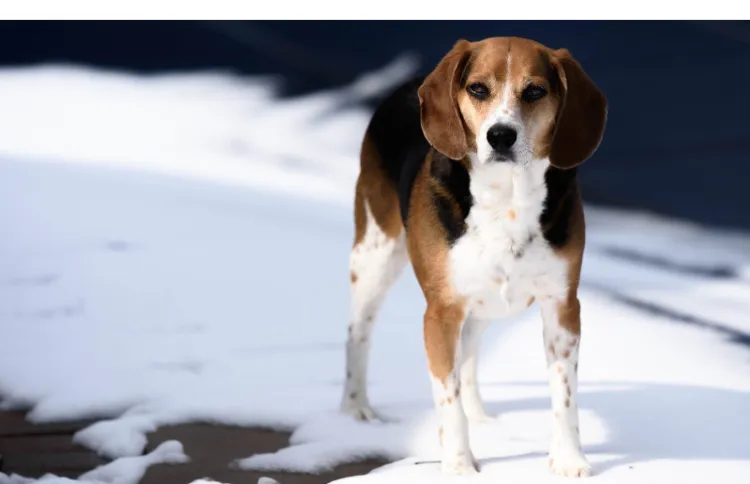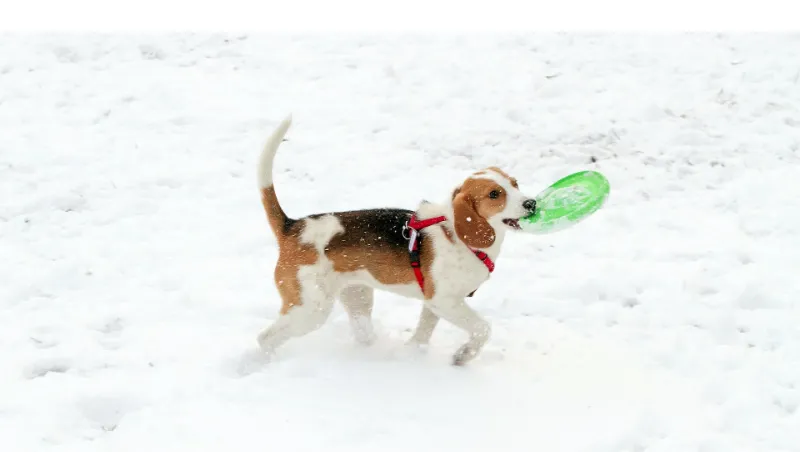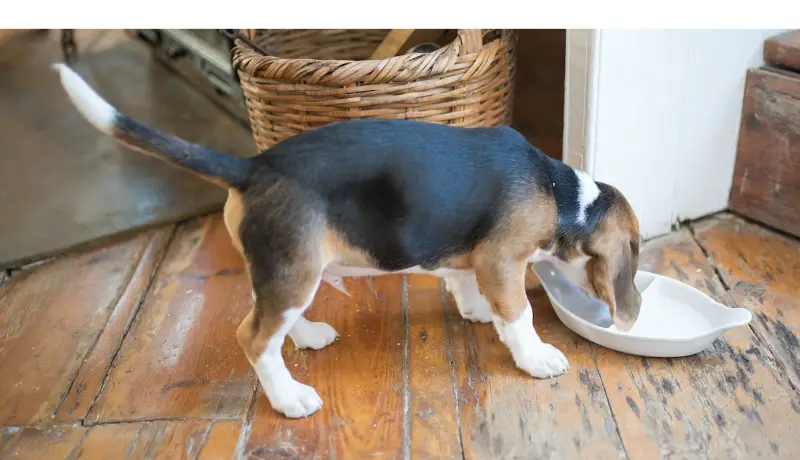Beagles are a lovable and popular breed known for their friendly nature and keen sense of smell.
As a beagle owner, you might wonder, can beagles get bloat?
While bloat is a serious concern for many dog breeds, it’s important to understand how it affects beagles specifically.
In this blog post, we’ll explore the topic of bloat in beagles, discuss its causes, and offer tips on prevention and treatment.
Understanding Bloat in Dogs
Before we dive into the specifics of beagles and bloat, it’s important to understand what bloat is and its risk factors in dogs.
What is Bloat?
Bloat, also known as Gastric Dilatation-Volvulus (GDV), is a life-threatening condition that occurs when a dog’s stomach fills with gas, fluid, or food, causing it to expand. This expansion can put pressure on surrounding organs and lead to reduced blood flow.
In some cases, the stomach may twist on itself, further obstructing blood flow and causing the tissue to die. If not treated immediately, bloat can be fatal.
Causes and Risk Factors
The exact cause of bloat remains unclear, but several factors are believed to contribute to its occurrence.
These include eating large meals quickly, gulping air while eating, vigorous exercise after eating, and drinking large amounts of water immediately after a meal.
Additionally, certain dog breeds with deep chests, like Great Danes and German Shepherds, are more prone to bloat.
Fun fact #1: Did you know that beagles were originally bred for hunting hare due to their exceptional sense of smell and tracking abilities? In fact, their sense of smell is so strong that they are often used by law enforcement for scent detection!
Do Beagles Really Get Bloat?
Now that we understand bloat and its risk factors, let’s examine how it relates to beagles.
Beagle’s Bloat Incidence
While it is possible for beagles to experience bloat, it is not as common as in some other dog breeds. Beagles have a relatively smaller and less deep chests than breeds like Great Danes, making them less prone to this condition.
However, this doesn’t mean beagles are completely immune to bloat. It’s essential to be aware of the signs and take preventive measures to keep your beagle healthy.
Why Beagles Are Less Prone
The main reason beagles are less susceptible to bloat is their body structure. Dogs with deep, narrow chests are more at risk because their stomachs have more room to twist and expand.
On the other hand, beagles have a more compact body shape, reducing the likelihood of their stomachs twisting or filling with excessive gas.
Fun fact #2: Beagles are one of the few dog breeds that have a white-tipped tail, which is called a "stern." This unique feature made it easier for hunters to spot their beagles while they were on the trail of their prey.
Recognizing the Signs of Bloat
Being able to identify the first signs of bloat in your beagle is crucial for seeking timely treatment and improving the chances of a positive outcome.
Some common symptoms of bloat in beagles include:
- A visibly swollen or distended abdomen
- Restlessness or pacing
- Unproductive attempts to vomit or retch
- Excessive drooling
- Rapid or labored breathing
- Weakness or collapse
If you suspect your beagle is experiencing bloat, it’s important to take them to a veterinarian immediately. Bloat is a medical emergency; prompt treatment is essential to prevent life-threatening complications.
Preventing Bloat in Beagles
While the risk of bloat in beagles is relatively low, taking precautions is still important to ensure your dog’s well-being. Here are some strategies to help prevent bloat in your beagle:
Feeding Strategies
- Feed your beagle smaller meals throughout the day instead of one or two large meals.
- Use a slow feeder or puzzle toy to encourage slower eating, which can help prevent gulping air.
- Avoid feeding your beagle immediately before or after vigorous exercise.
- Keep an eye on your beagle while eating to ensure they’re not swallowing too much air.5.2 Exercise Guidelines
- Allow your beagle to rest for at least an hour before and after meals to reduce the risk of bloat.
- Avoid letting your beagle drink excessive amounts of water immediately after eating or exercising.
- Encourage regular, moderate exercise to help promote healthy digestion.
What to Do If Your Beagle Experiences Bloat
If you suspect your beagle is suffering from bloat, acting quickly is essential. Here’s what to do if you believe your beagle has bloat:
- Stay calm: Panicking will only stress your dog more, making the situation worse. Take a deep breath and remain as calm as possible.
- Call your veterinarian: Contact your vet immediately and inform them of your beagle’s condition. They’ll likely advise you to bring your dog in right away.
- Transport your beagle carefully: When moving your beagle to the car, support its abdomen gently to minimize discomfort.
- Prepare for emergency treatment: Depending on the severity of the bloat, your vet may need to perform emergency surgery or other treatments. Be prepared for this possibility.
Remember, time is of the essence when dealing with bloat. The sooner your beagle receives treatment, the better their chances of recovery.
Conclusion: Keeping Your Beagle Healthy and Happy
In summary, while bloat is less common in beagles than in some other dog breeds, it’s still essential to be aware of the risk factors, symptoms, and prevention strategies.
By providing your beagle with a healthy diet, appropriate exercise, and regular veterinary check-ups, you can minimize the risk of bloat and ensure your furry friend stays happy and healthy for years to come.
Don’t forget to explore our other helpful resources on beagle care, such as dogs that get along well with beagles and what smell do dogs hate.
Being proactive and attentive to your beagle’s needs will create a loving and nurturing environment for your beloved pet.
Remember, prevention, awareness, and timely intervention are key to a healthy beagle. Keep an eye on your furry friend, and enjoy the companionship of your loyal, loving beagle.
![Do-Beagles-get-bloat]](https://www.howtoanimal.com/wp-content/uploads/2023/04/Featured_Image-Do-Beagles-get-bloat.webp)









